
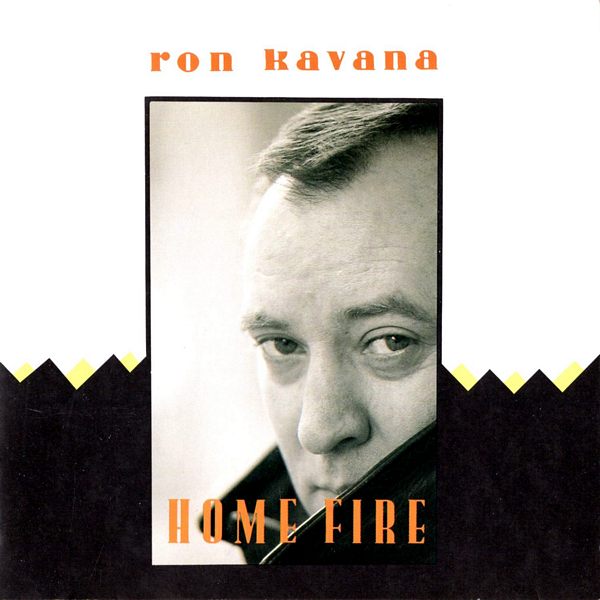 |
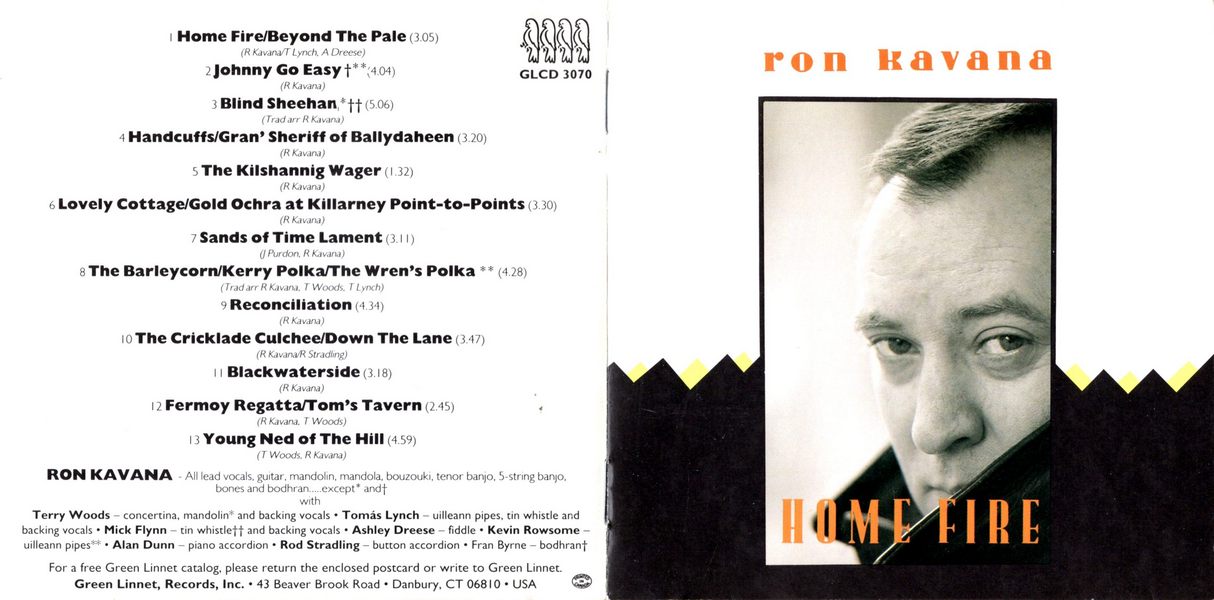
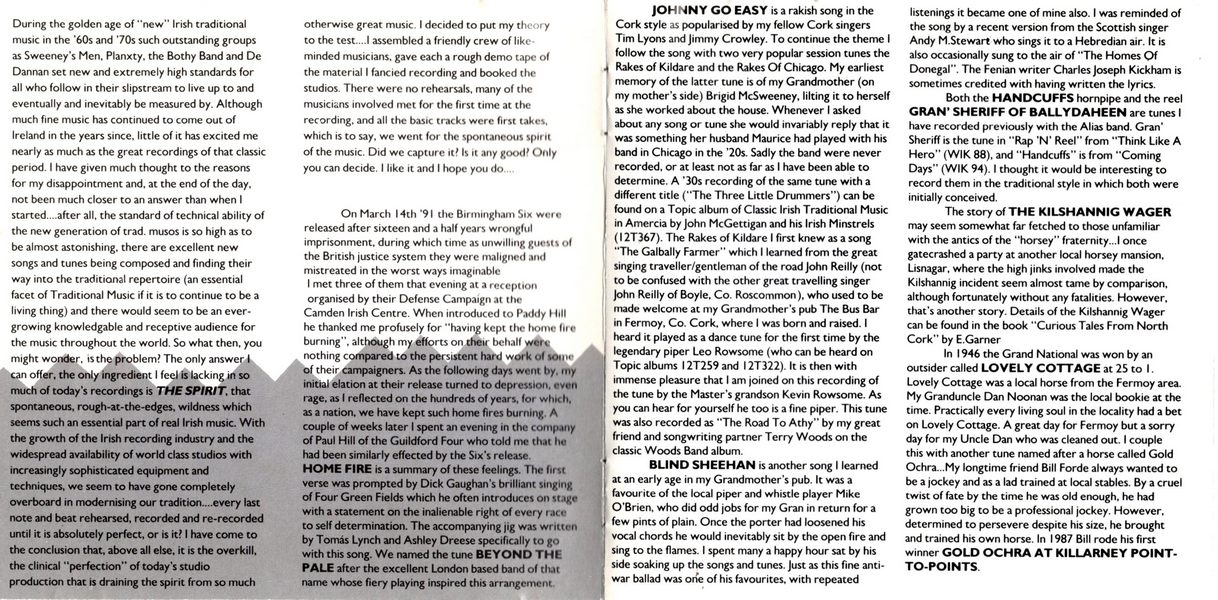
|
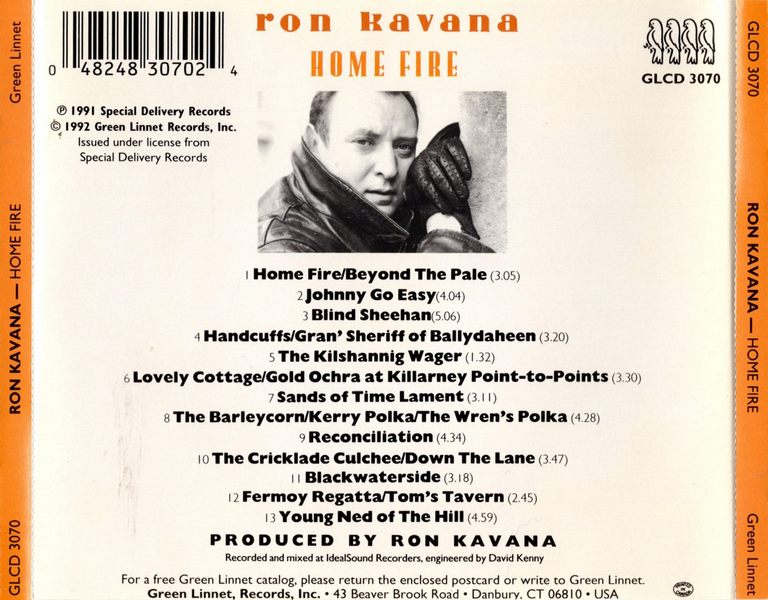
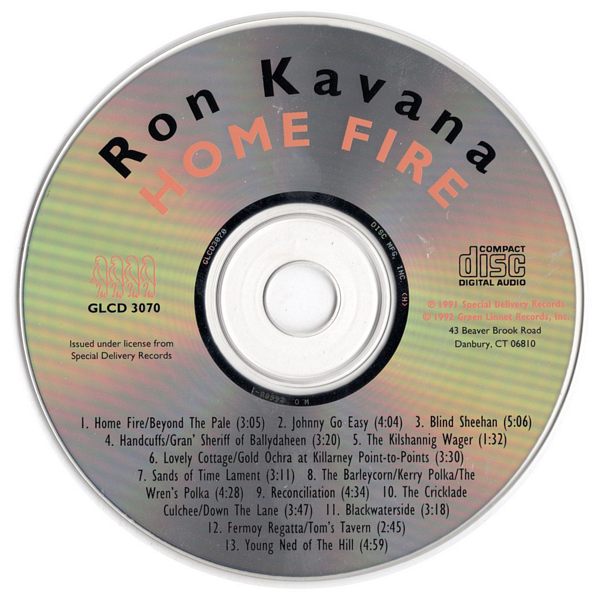 |
| more images |
Sleeve Notes
During the golden age of "new" Irish traditional music in the '60s and '70s such outstanding groups as Sweeney's Men, Planxty, the Bothy Band and De Dannan set new and extremely high standards for all who follow in their slipstream to live up to and eventually and inevitably be measured by. Although much fine music has continued to come out of Ireland in the years since, little of it has excited me nearly as much as the great recordings of that classic period. I have given much thought to the reasons for my disappointment and, at the end of the day, not been much closer to an answer than when I started … after all, the standard of technical ability of the new generation of trad. musos is so high as to be almost astonishing, there are excellent new songs and tunes being composed and finding their way into the traditional repertoire (an essential facet of Traditional Music if it is to continue to be a living thing) and there would seem to be an evergrowing knowledgable and receptive audience for the music throughout the world. So what then, you might wonder, is the problem? The only answer l can offer, the only ingredient I feel is lacking in so much of today's recordings is THE SPIRIT, that spontaneous, rough-at-the-edges, wildness which seems such an essential part of real Irish music. With the growth of the Irish recording industry and the widespread availability of world class studios with increasingly sophisticated equipment and techniques, we seem to have gone completely overboard in modernising our tradition … every last note and beat rehearsed, recorded and re-recorded until it is absolutely perfect, or is it? I have come to the conclusion that, above all else, it is the overkill, the clinical "perfection" of today's studio production that is draining the spirit from so much otherwise great music. I decided to put my theory to the test … I assembled a friendly crew of like-minded musicians, gave each a rough demo tape of the material I fancied recording and booked the studios. There were no rehearsals, many of the musicians involved met for the first time at the recording, and all the basic tracks were first takes, which is to say, we went for the spontaneous spirit of the music. Did we capture it? Is it any good? Only you can decide. I like it and I hope you do …
On March 14th '91 the Birmingham Six were released after sixteen and a half years wrongful imprisonment, during which time as unwilling guests of the British justice system they were maligned and mistreated in the worst ways imaginable I met three of them that evening at a reception organised by their Defense Campaign at the Camden Irish Centre. When introduced to Paddy Hill he thanked me profusely for "having kept the home fire burning", although my efforts on then behalf were nothing compared to the persistent hard work of some of their campaigners. As the following days went by, my initial elation at their release turned to depression, even rage, as I reflected on the hundreds of years, for which, as a nation, we have kept such home fires burning. A couple of weeks later I spent an evening in the company of Paul Hill of the Guildford Four who told me that he had been similarly effected by the Six's release.
HOME FIRE is a summary of these feelings. The first verse was prompted by Dick Gaughan's brilliant singing of Four Green Fields which he often introduces on stage with a statement on the inalienable right of every race to self determination. The accompanying jig was written by Tomás Lynch and Ashley Dreese specifically to go with this song. We named the tune BEYOND THE PALE after the excellent London based band of that name whose fiery playing inspired this arrangement.
JOHNNY GO EASY is a rakish song in the Cork style as popularised by my fellow Cork singers Tim Lyons and Jimmy Crowley. To continue the theme I follow the song with two very popular session tunes the Rakes of Kildare and the Rakes Of Chicago. My earliest memory of the latter tune is of my Grandmother (on my mother's side) Brigid McSweeney, lilting it to herself as she worked about the house. Whenever I asked about any song or tune she would invariably reply that it was something her husband Maurice had played with his band in Chicago in the '20s. Sadly the band were never recorded, or at least not as far as I have been able to determine. A '30s recording of the same tune with a different title ("The Three Little Drummers") can be found on a Topic album of Classic Irish Traditional Music in Amercia by John McGettigan and his Irish Minstrels (12T367). The Rakes of Kildare I first knew as a song "The Galbally Farmer" which I learned from the great singing traveller/gentleman of the road John Reilly (not to be confused with the other great travelling singer John Reilly of Boyle, Co. Roscommon), who used to be made welcome at my Grandmother's pub The Bus Bar in Fermoy, Co. Cork, where I was born and raised. I heard it played as a dance tune for the first time by the legendary piper Leo Rowsome (who can be heard on Topic albums 12T259 and 12T322). It is then with immense pleasure that I am joined on this recording of the tune by the Master's grandson Kevin Rowsome. As you can hear for yourself he too is a fine piper. This tune was also recorded as "The Road To Athy" by my great friend and songwriting partner Terry Woods on the classic Woods Band album.
BLIND SHEEHAN is another song I learned at an early age in my Grandmother's pub. It was a favourite of the local piper and whistle player Mike O'Brien, who did odd jobs for my Gran in return for a few pints of plain. Once the porter had loosened his vocal chords he would inevitably sit by the open fire and sing to the flames. I spent many a happy hour sat by his side soaking up the songs and tunes. Just as this fine antiwar ballad was one of his favourites, with repeated listenings it became one of mine also. I was reminded of the song by a recent version from the Scottish singer Andy M. Stewart who sings it to a Hebredian air. It is also occasionally sung to the air of "The Homes of Donegal". The Fenian writer Charles Joseph Kickham is sometimes credited with having written the lyrics.
Both the HANDCUFFS hornpipe and the reel GRAN' SHERIFF OF BALLYDAHEEN are tunes I have recorded previously with the Alias band. Gran' Sheriff is the tune in "Rap 'N' Reel" from "Think Like A Hero" (WIK 88), and "Handcuffs" is from "Coming Days" (WIK 94). I thought it would be interesting to record them in the traditional style in which both were initially conceived.
The story of THE KILSHANNIG WAGER may seem somewhat far fetched to those unfamiliar with the antics of the "horsey" fraternity … I once gatecrashed a party at another local horsey mansion, Lisnagar, where the high jinks involved made the Kilshannig incident seem almost tame by comparison, although fortunately without any fatalities. However, that's another story. Details of the Kilshannig Wager can be found in the book "Curious Tales From North Cork" by E.Garner
In 1946 the Grand National was won by an outsider called LOVELY COTTAGE at 25 to 1. Lovely Cottage was a local horse from the Fermoy area. My Granduncle Dan Noonan was the local bookie at the time. Practically every living soul in the locality had a bet on Lovely Cottage. A great day for Fermoy but a sorry day for my Uncle Dan who was cleaned out. I couple this with another tune named after a horse called Gold Ochra … My longtime friend Bill Forde always wanted to be a jockey and as a lad trained at local stables. By a cruel twist of fate by the time he was old enough, he had grown too big to be a professional jockey. However, determined to persevere despite his size, he brought and trained his own horse. In 1987 Bill rode his first winner GOLD OCHRA AT KILLARNEY POINT-TO-POINTS.
I tried to write the air for SANDS OF TIME LAMENT with both an Irish and a Scottish feel. The words were written by the great Jock Purdon. In my opinion, Jock is the finest political lyricist in the British Isles. Through frequent visits to his neck-of-the-woods in County Durham we have become good friends. It was one of the great pleasures of my life when he joined me on stage during the Sidmouth Folk Festival of 1990.
I learned this particular Irish version of THE BARLEYCORN (a.k.a. JOHN BARLEYCORN) from the singing of the Johnstons. The Johnstons were a vastly under-rated '60s group who, because of their chart success with covers of contemporary classic songs such as The Travelling People, Both Sides Now and Streets Of London were slotted into the same MOR vocal group bag as such lightweight acts as the Seekers. However, the lesser known side of the group, and their real forte was when they applied their talents to traditional material. This is hardly surprising when you consider that the instrumental side of the band was handled by Mick Moloney (who went on to become the Dónal Lunny of the Irish scene in America) and none other than the ubiquitous Paul Brady. I had the good fortune to catch the Johnstons live once, and was positively gobsmacked by Brady's feel and ability. His guitar style was the main influence on my own approach to acoustic guitar and to this day his unique style of Irish pickin' is rivalled only by the great Arty McGlynn. I follow the Barleycorn with a couple of Kerry Polkas. I have heard the first tune referred to by a virtual plethora of different names but it is most commonly known simply as THE KERRY POLKA. The second tune THE WREN'S POLKA is one of those delightful happy, sunny, skipping tunes which I find totally irresistable … these polkas feature both Tomás and Kevin on pipes.
When asked to contribute a couple of songs to the fund-raising album "Justic For The Birmingham Six", I attempted to write something about the Six's horrific mistreatment, but found that nothing I came up with was a patch on Shane MacGowan's brilliant "BIRMINGHAM SIX" from The Pogues' "if I Should Fall From Grace With God" album which I had played on as a guest musician. So I re-recorded Shane's song and wrote RECONCILIATION to go with it. I feel justified in recording a new version of this song as this is the first time circumstances have allowed me the opportunity to have other musicians play on it and I hope you'll agree that Terry's concertina and Tomás's whistle rise to the occasion magnificently. Anyway, of all the songs I have written to date, this one is my favourite. The lovers in the song are meant to represent the North and South of Ireland.
I named the tune THE CRICKLADE CULCHEE after the English Country Dance box player Rod Stradling who joins me on this set of tunes. Rod and his wife Danny have become good friends of mine in recent years and I always look forward to seeing them, both for their splendid company and the possibility of a song and a tune or two over a pint or ten! DOWN THE LANE is one of Rod's compositions which, while most definitely English in feel, also puts me in mind of such classic Kerry slides as Chase Me Charlie and Danny Ab's. Slides are a lovely old fashioned type of tune with a "twisht" particular to the Cork and Kerry regions. Easygoing happy music.
I wrote BLACKWATERSIDE during a period of severe homesickness whilst living in America. Although it is fairly typical of expatriate ballads in praise of "the old country", it's sentiments are heartfelt … the river that runs from the Cork/Kerry border area known as Sliabh Luachra (the source of some great traditional music, much of which can be found on the Topic albums MUSIC FROM SLIABH LUACHRA Vols 1-6) through "Fermoy, to Youghal down by the sea" really is one of the most beautiful sights I have ever seen. I recorded a contemporary arrangement of this song on the LILT album "For The Children" (ET 191) but, as with the Handcuffs set, I originally meant this song to be sung as it appears here.
My brother Paul is the captain of the Fermoy Rowing club and their highly successful No. 1 crew which brought great glory to the club in 1990 by winning the All-Ireland Championship. The annual FERMOY REGATTA is a highlight of the local social calendar with clubs from all over Ireland and abroad competing on the stretch of the Blackwater known as Barnane. TOM'S TAVERN was the pub of my cousins the O'Gradys, and was traditionally the favoured watering hole of the Rowing Club until a few years ago when they built their own social club; a fine establishment in which I have sunk the odd jorum of black porter and even sang a few songs. My main influence in writing the Fermoy Regatta was the late Jack Devine, a great local character who made up some great "fun" songs about local events. I feel sure that if Jack had lived to witness the club's great victory he would have written a song not dissimilar to this to commemorate the event.
There have been numerous songs written about Ned of the Hill both in English and in Irish (Eamonn an Chnoic), but none have told the full story, which is precisely what Terry Woods and myself set out to do in YOUNG NED OF THE HILL Terry and I sang this song in the controversial Ken Loach movie Hidden Agenda. The film was slated by the more right wing British newspapers (despite winning the Cannes Film Festival's Grand Jury Award) but this was no surprise as the movie deals with the shoot-to-kill policy in Northern Ireland and MI5's smearing of the Wilson government to put the Tories in power, where they have been ever since. These are the same right wing newspapers which try to convince the British public that anyone in favour of a united Ireland is automatically a terrorist or at least in favour of terrorism, while conveniently ignoring eight centuries of terrorism against the people of Ireland.
I have left the last word on this album to Paul Hill and a short extract from Lord Denning's infamous Appalling Vista speech at the Birmingham Six appeal in Jan. 1980.